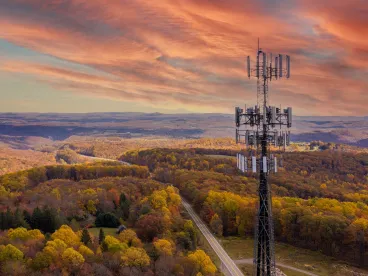With tens of billions of dollars being made available for rural broadband infrastructure projects, electric utilities – including rural electric cooperatives, publicly owned power companies, and investor owned utilities – stand ready to play a crucial role in bringing broadband to unserved and underserved areas of the U.S. Easement issues are a significant concern for many of them.
Utilities have easement agreements with private property owners that allow the utility to install poles and run wires across a strip of property. A single utility may have hundreds or even thousands of such agreements adopted at various times over a utility’s long history. While these easements were secured to transmit electric power, the addition of broadband infrastructure for the purpose of providing commercial communications services – even just an additional fiber optic cable –may potentially exceed the scope of the easement, leading to potential claims by landowners for damages based in trespass, unjust enrichment, or other legal theories.
Fortunately, an increasing number of states have alleviated this concern. Seeking to encourage the development of broadband infrastructure in rural areas, roughly 20 states have implemented some form of legislative fix, most within the past three years. These include: Alabama, Arizona, Colorado, Georgia, Hawaii, Maryland, Michigan, Minnesota, Mississippi, Missouri, Nebraska, North Carolina, Ohio, Oregon, Pennsylvania, South Carolina, Tennessee, Texas, Vermont, Virginia, and West Virginia.[1]
Easements are Messy
If a utility’s easements were generally the same, or if they were negotiated with just a handful of landowners, the challenge would be less daunting: the utility could simply propose a set of easement modifications to accommodate communications infrastructure. The landowner may (or may not) seek additional compensation in such a case, but it would probably be manageable.
But electric utilities (or their predecessors in interest) have been around a long time. The easements may have been executed last year or a hundred years ago. They may involve a large number of landowners with disparate priorities. Some may be cooperative; some may not. Some may be difficult to locate. In short, attempting to amend a utility’s existing easement agreements is potentially a tall order.
Will the Existing Easements Work?
It is possible that a utility’s existing easements will accommodate the installation and operation of new fiber optic facilities within the easement. Several factors should be considered, among them:
-
What is the exact language of the easement? Is it expressly limited to the provision of electric service, or can it be interpreted more broadly?
-
Does the existing easement allow the utility to install, maintain, and operate fiber in support of electric service (SCADA, AMI, Distribution Automation, etc.)?
-
Do third-party fiber or cable communication lines exist within the easement?
-
What is the additional physical burden on the servient estate?
-
How do the relevant state’s courts decide cases involving contractual gaps or ambiguities?
While a number of cases have considered whether electric easements may include communications facilities within their scope, they tend to be fact-specific and not entirely consistent.
Assessing Risks and Rewards
Without protective legislation, an electric utility that seeks to deploy fiber infrastructure for commercial broadband within its existing electric easements will need to weigh the benefits of the deployment against the potential risk of legal action, factoring in the significant federal and state funding available to bring fiber-based broadband to unserved and underserved areas of the country.
FOOTNOTES
[1] The majority of these state laws are directed toward electric cooperative utility easements.





 />i
/>i

